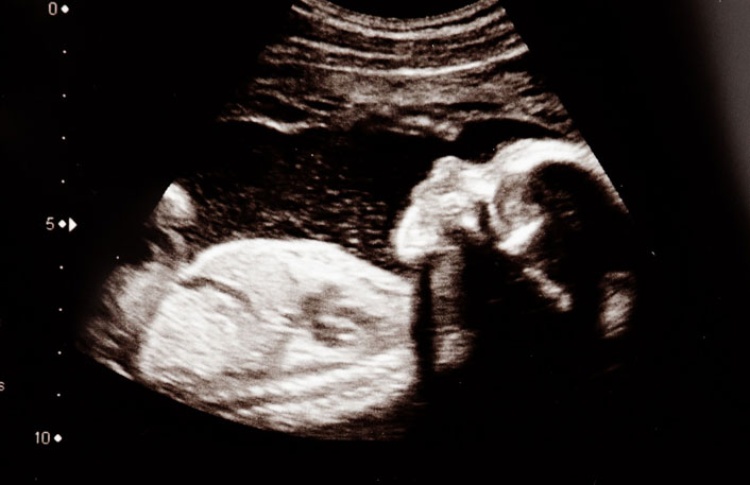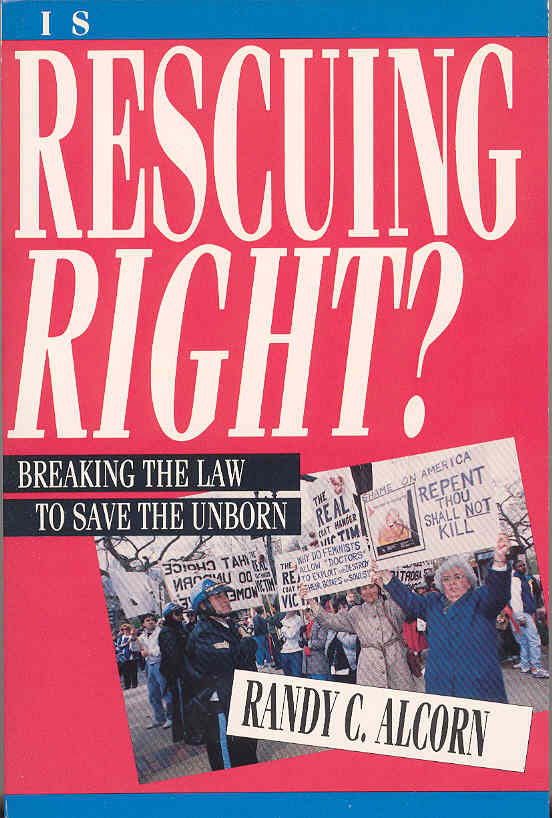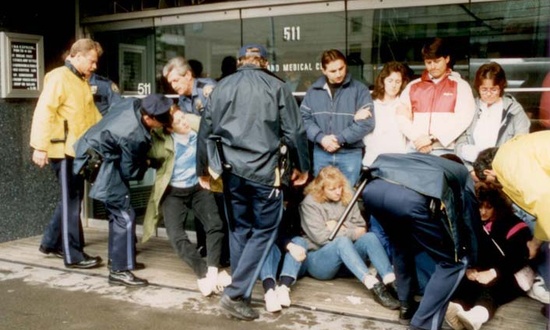The Reason for Rescuing
“Rescuing” is a united action in which people peacefully place their bodies in front of the entrances of an abortion clinic. The purpose is to prevent access to the clinic, and to thereby save the lives of unborn children who would otherwise be killed shortly after their mothers enter the building.
Of course, mothers denied entrance still have the option of rescheduling an appointment at another time, at the same clinic or a different one. But the rescue accomplishes several vital things. First and foremost, it buys time for the unborn child. The child does not die today. Second, there is a good chance the child will not die at all—for any number of reasons his mother might decide not to have an abortion, or to delay indefinitely rescheduling an abortion. Planned Parenthood estimates that 20% of women who miss their initial appointment for an abortion, regardless of the reason, do not end up getting an abortion at all.
The theme of intervening on behalf of the weak and vulnerable, of protecting the helpless from the abuses of others, is central to literally hundreds of passages, and is one of the most dominant themes in the entire Bible. Typical of these passages is Proverbs 31:8-9 which states, “Speak up for those who cannot speak for themselves, for the rights of all who are destitute. Speak up and judge fairly; defend the rights of the poor and needy.”
The dominant and pervasive theme of intervention can be seen by a study of passages containing words such as “rescue,” “help,” “save,” “defend,” and “love,” as well as “poor,” “weak,” “innocent” and “needy.” There are literally hundreds of commands to intervene for those in need, whose rights are being violated, and whose lives are in danger.
Scripture says we are to “Rescue those being led away to death; hold back those staggering toward slaughter” (Prov. 24:11). We are to “Defend the cause of the weak and fatherless; maintain the rights of the poor and oppressed. Rescue the weak and needy; deliver them from the hand of the wicked” (Ps. 82:3-4). We are commanded to intervene for the fatherless and poor, those deprived of their basic human rights (Deut. 10:18; 14:29; Ps. 10:14; Is. 1:17; 58:6-7; Jer. 49:11).
The word nasal, translated “rescue” in Proverbs 24:11, is used just over two hundred times in the Old Testament, and is often translated “deliver.” The vast majority of the time it refers to an act of intervention to save a person or nation from actual physical enemies who are about to kill or harm them (e.g. Josh. 2:13; 1 Sam. 30:18). The Expository Dictionary of Bible Words states, “Nasal is a word that means ‘to deliver or save.’ It is usually used of a literal, personal deliverance from danger.”
In twenty-seven cases, including Proverbs 24:11, nasal is used as an imperative or command. It is a plea of desperation to rescue those about to be physically killed (Gen. 32:11; Jud. 10:15; Ps. 59:1-2; 142:6-7). In one of these cases God specifically says it is evil not to try to rescue the innocent person (Jer. 21:12).
If Proverbs 24:11 applies to all innocent people—and there is no indication it does not—then either the unborn are not innocent people, or it does in fact apply to them. By the time their mothers reach the abortion clinic, the unborn are within minutes of being torn to pieces, and are therefore clearly in need of physical rescue. Obviously, it would have been better to prevent the scheduled abortion through other forms of intervention, including education, counseling, and legislation. The fact of the matter is, however, that these approaches did not prevent the killing of the child. If signs or sidewalk counseling outside the clinic do not dissuade the woman from getting an abortion (sometimes they do, often they don’t), then physically preventing entrance to the clinic is the only remaining nonviolent avenue to save the child’s life.
The Larger Question of Civil Disobedience
Should a first century Christian obey the law demanding a sacrifice to the emperor? Should a second century Christian obey the law forbidding care for Roman children left to die outside the city gates? Should a nineteenth century American obey laws forbidding help to an escaped slave? Should an early twentieth century Christian in India interfere with the legal act of widow burning, and try to save an innocent woman’s life? Should a middle twentieth century citizen of Germany or occupied Europe obey the laws forbidding interference with the killing of Jews, Gypsies, and the mentally retarded?
Should a nurse living today in the Netherlands violate an order not to interfere with legal euthanasia in the hospital? Should parents in Sweden obey the law that says children cannot be spanked, or should they apply the corporal punishment advocated in Scripture? Should a missionary to the Middle East obey laws forbidding evangelization? Should Christian churches obey the church discipline pattern of Matthew 18, or should they follow the court interpretations of libel and privacy laws that forbid such action?
Should Christians in the future obey the civil laws that will require taking a mark on the wrist or forehead, or should they disobey? Is it right or wrong for a Christian to violate kidnapping laws by temporarily taking, hiding and caring for a child who is being starved to death by her drug-crazed parent? Is it right or wrong for some Christians to decide they will not obey the law forbidding them to save lives about to be killed at abortion clinics?
Clearly, the question of civil disobedience to save the unborn is not an isolated issue. It is linked to a host of other issues in which Christians must decide whether there is a point that they can or must violate civil law in order to do what is right in God’s eyes.
Civil Disobedience in Church History
Civil disobedience and the consequences of imprisonment and confiscation of property were common among New Testament Christians (Acts 17:6-7; Heb. 10:32-36). Tens of thousands of early Christians were put to death because they refused to obey the laws requiring them to do homage to Caesar. Such well-known leaders as William Tyndale, Martin Luther, John Calvin, John Knox, and John Bunyan all practiced civil disobedience.
Missionaries to the American Indians went to jail rather than put up with the terrible abuses of the Indians by the state and nation. The Underground Railroad—designed to save the lives of slaves and get them to freedom—broke the explicit laws of congress, the decision of the Supreme Court, and the personal order of the President of the United States. The Underground Railroad was participated in by preachers such as Charles Finney and Charles Beecher, as well as thousands of committed Christians, who at great personal cost (including jail, steep fines and confiscation of property) saved the lives of thousands of slaves.
Dietrich Bonhoeffer and Martin Niemoller were among a small number of pastors who led the Christians of Germany in standing up against the Nazi Terror by violating the law to intervene for the Jewish people. This cost Bonhoeffer his life, and Niemoller seven years in Dachau. In Poland’s Warsaw Ghetto, giving food, water or shelter to a Jew, even if he would die without it, was punishable by death. But the Council for Aid to Jews, founded by Wladyslaw Bartoszewski, supplied Jews not only with food and shelter, but falsified birth certificates, baptismal certificates, identification papers and forged work permits. All this illegal intervention saved the lives of about ten thousand human beings. The courageous civil disobedience of the ten Boom family in Holland is well known to readers of The Hiding Place. Philip Hallie’s Lest Innocent Blood Be Shed tells the amazing story of Pastor Andre Trocme’s church in Le Chambon, France, which continually violated the law to save the lives of 2500 Jews over the course of the war.
We must not forget that these loving acts of intervention now regarded as good and even heroic were not only questioned but actively opposed by people—Christian people—at the time they were actually done. This raises the question, what actions are Christians now opposing that the church will one day look back on and recognize as having been right?
Throughout the ages and around the globe it has been normal for God’s people to have to choose between obeying God and men. We have the luxury of debating an issue which is already settled for Christians in sixty per cent of the world’s population areas, where to be a Christian and to obey the Lord requires regular civil disobedience.
But the fact that Christians have chosen the path of civil disobedience doesn’t make it right. The most important question is, does the Bible allow or condone civil disobedience? If so, under what kinds of circumstances? And do these circumstances include the imminent death of an unborn child at an abortion clinic?
Civil Disobedience in the Bible
A few of the biblical examples of civil disobedience relate to the matters of worship or evangelism, as in the cases of Daniel’s three friends (Dan. 3:16-18), and the apostles (Acts 5:29). The majority, however, focus directly on the issue of the sanctity of human life and the consequent attempts of believers to deliver innocent human beings from being killed.
The Hebrew midwives disobeyed the king’s command to kill the children, and Moses parents also violated the law to save his life (Ex. 1:17; 2:1-4). Both received God’s explicit commendation for doing so (Ex. 1:20-21; Heb. 11:23).
The prohibition from saving certain innocent human lives was disobeyed by Rahab who rescued the spies from the authorities of Jericho (Josh. 2, James 2:25), the men of Israel who rescued Jonathan from King Saul (1 Sam. 14:24-45), Obadiah who rescued the prophets from Queen Jezebel (1 Kings 18), Jehosheba who rescued the infant Joash from Queen Athaliah (2 Kings 11:1-3), Esther who trespassed in the king’s court to rescue the Jews (Est. 4), and the Magi who disobeyed Herod to protect the baby Jesus (Matt. 2:7-8).
In each case the people rescued from death were innocent, and in each case the person they were rescued from had legal authority to have them killed. In almost every case those rescuing did so through direct non-violent intervention on behalf of the one about to be killed.
We might also include Jeremiah who betrayed his government by advocating surrender to save the lives of Israelites (Jer. 38:1-6), the angel who warned the wise men to disobey Herod, as well as Joseph himself who fled from Herod with Mary and Jesus. There’s also the angel who rescued Peter from execution at the hands of Herod Antipas (Acts 12). We could add David who fled for his life from King Saul, Elijah who fled for his life from Ahab, and Peter who fled for his life from the prison opened by the angel. In each case the motive for civil disobedience was to save an innocent life, either another’s or one’s own.
Note that of all these examples, only the midwives were disobeying a command to take human lives. All the rest violated laws or commands (the king’s command was law) of those in authority that would keep them from rescuing innocent lives.
Jesus, Laws, and Human Welfare
Jesus had no legal right to interfere with the business of buying and selling in the temple (John 2:13-16). Even his resurrection broke the Roman seal on the tomb that carried all the authority of the government.
Jesus often violated the Jewish laws related to the Sabbath, in the higher interest of rescuing needy people from death or disease (Luke 6:9; 13:15; 14:5). A summarizing principle, in Christ’s own words, was this: “The Sabbath was made for man, not man for the Sabbath” (Mark 2:27). We must not limit this principle only to the Sabbath. The timeless principle is “Human law was made for human welfare, not human welfare for the law.” Any good law is designed for the protection of people, not to deprive them from protection.
Jesus rebuked the Pharisees for getting caught up in secondary legal points—”But you have neglected the more important matters of the law—justice, mercy and faithfulness . . . You blind guides! You strain out a gnat but swallow a camel” (Matt. 23:23-24). We must be careful not to strain out the gnat of trespassing while swallowing the camel of children being slaughtered.
What About Romans 13?
In Romans 13:1-7 Paul says the Christian should obey government. Why? He says it is because government fulfills the God-intended purpose of rewarding righteousness and punishing evil (Deut. 25:1). What is God’s posture toward civil laws which protect evil-doing, and punish righteousness? “Acquitting the guilty and condemning the innocent—the LORD detests them both” (Prov. 17:15).
Paul says the government we are to obey is “God’s servant” (Rom. 13:4). The state is the representative of God to society in the same sense that a baby-sitter is the representative of parents to their children. God delegates authority to the state just as parents delegate authority to the babysitter. But God does not give unconditional authority to the state any more than parents give unconditional authority to the baby-sitter.
We must realize that the law does not only permit abortion. It actually prohibits intervention to save lives at the very place they are being taken. It actively facilitates abortion, in that it forcibly removes those who would peacefully prevent it. It fines such people, puts them in jail, and awards their money to abortion clinics, in order to assure that child-killing can continue.
The fact that we are not forced to get abortions does not settle the moral issue. It is rare that laws directly command people to do what is evil. In a republic such as our own they almost never will. More often they will command people to allow evil, to not interfere with evil, to not intervene for innocent lives. In other words, governments order sins of omission much more often than sins of commission.
The law did not require that the German people kill Jews. The law only required that they stand passively by while others killed them. Likewise, our law “only” requires that no one be able to go to the killing place and stand between the baby and the knife. (Some object to comparing Nazi Germany and the United States, which were two very different countries. But the point of the comparison is not the intent of the governments, but the reality of the victims. True as it may be, it is no consolation to 4500 innocent victims a day that they are being killed in the greatest republic the world has ever known.)
Scripture doesn’t say, “anyone who knows the evil he shouldn’t do and does it, sins.” That is obviously true, but the Bible says something more: “Anyone, then, who knows the good he ought to do and doesn’t do it, sins” (James 4:17). This means we cannot say “no one requires me to sin by killing my child, therefore I am not morally obligated to save the lives of children being killed by others.” God doesn’t simply tell us not to kill—he also tells us to rescue those about to be killed. If it is right to intervene for the innocent, then a law that prevents intervention prevents people from doing what is right.
The Law of Love
Jesus said that there was one law above all others, and upon which all others were based—love God with all you are, and “love your neighbor as yourself” (Matt. 22:37-40). Jesus extends this law in the form of the golden rule: “In everything, do for others as you would have them do for you, for this sums up the Law and the Prophets” (Matt. 7:12). We should ask ourselves the question, if we were being taken to a brutal death, what would we like someone to do for us at that moment? Take all the arguments against civil disobedience to save the unborn, and imagine yourself stating them before an audience of slaves, Jews or unborn children about to die.
In cases where helping victims is illegal, there are two conflicting ethical demands, one of which will be met and one unmet no matter what we do. One demand is to love your neighbor by saving his life. The other demand is to obey civil law. One of these ethical demands must be placed over the other. The question, then, is not should we disobey an authority, but which authority should we disobey—man’s or God’s?
If the lake is clearly posted “no swimming,” but I see a child drowning in it, I do not debate the ethics of violating the “no swimming” law. The law of love tells me to jump in, swim to the child, and save his life. By jumping in I am not saying that the “no swimming” law is bad. I am saying that in this case it is transcended by a higher law, the “royal law of love.”
We are in danger today of falling into the same error that the expert in the law fell into when he attempted to exclude certain people from his definition of neighbor (Luke 10:29). That class of human beings called the unborn can be considered “unneighbors” either by overtly being declared inhuman, or by being treated as if they are not human by failing to do for them what one would do for other humans. If those were five year old children being legally butchered at the clinic every day, would I feel any differently about civil disobedience? If so, why? Are the unborn fully human, created in God’s image, or are they not?
The most critical premise behind rescuing is that the unborn is a human child, created in the image of God, as valuable in the sight of God as any born person. If the unborn is less than that in our minds, then inevitably beneath the surface of our discussion will be the unspoken thought, “yes, it might be right to violate civil law to save a real human life, but this is different.”
I have found that when the point is actually pressed, those who think of themselves as prolife often make a definite distinction between the nature and value of born people and unborn people. This distinction, no matter how silent or subtle, will inevitably affect their view of rescuing, since civil disobedience is a drastic measure that can only be justified if the unborn are truly human and of great value in the sight of God.
Suppose you heard that I drove a car ninety miles an hour down a freeway. Was I right or wrong? I was wrong, of course. After all, I broke the law. If you heard that a policeman had pulled me over and cited me you’d say, “fine, he deserved it.”
But suppose you found out later that lying in the back of the car was my little daughter, who had a ruptured appendix. She could have died any minute, and I broke the law in an attempt to get her to the doctor to save her life. Would this additional factor affect your opinion about whether my action was right or wrong? Of course it would. As long as you focus on the law, on the speed limit, on why Christians must always obey such laws, you will condemn my action. But when you remember the little child in the back seat, it changes everything. The child about to die makes all the difference.
These and many other points are more fully developed in the 1991 book Is Rescuing Right?, by Randy Alcorn, InterVarsity Press. The book is now out of print.






